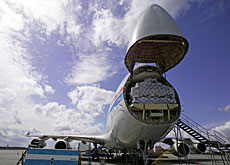moving freight is swiss speciality

The Swiss have the advantage of expertise when it comes to freight and logistics as well as many years of experience dating back to the days when trade routes were rudimentary.
Basel-based firm Panalpina says its success comes partly from its location, but also from its focus on special training for its staff.
Panalpina describes itself as a “provider of forwarding and logistics services, specialising in intercontinental air and ocean freight and supply chain management solutions”. With offices on every continent, the Swiss group has an average annual turnover of SFr6 billion ($4.85 billion).
“The public doesn’t really understand what our branch does,” says company spokesman Martin Spohn. “But logistics is an important cog in the wheel of the [global] economy.”
Often described as the architect of transport, logistics companies are relied on more and more to link together the production elements of its customers. Their role has been enhanced by the internet.
But like its clientele, the logistics firm outsources much of the work. It organises the transport of goods, operates as a broker, and prefers hiring to buying its own fleet of trucks, rail carriages and warehouses so as not to tie up capital.
Fragmentation
Worldwide, there has been a significant fragmentation of the freight and logistics business, with even the big companies having no more than an eight or nine per cent market share.
Few of the major players are based in Switzerland, but there are at least 70 small firms in Basel alone.
Spohn says Switzerland’s
geopolitical situation gives it a competitive edge in the trade, as well as its focus on providing the training for people planning a career in the industry.
“One learns the complex business of cross-border trade at the ground level,” he says, adding that this is one reason why so many Swiss hold top positions at many logistics companies worldwide.
Germany is the only other country which churns out professionals specifically trained to work in the industry. In the English-speaking world, new recruits are expected to learn by doing – which, Spohn says, has many disadvantages.
Swiss professionals are expected to provide a premium service wherever
they may be working in the world.
They are called upon to find solutions in places with poor transport infrastructure and in these cases, professionals with an education in logistics prove to be more successful than employees who have learned their trade on the job.
Loyalty
Panalpina has remained loyal to its branch locations over the years. “We would never close a location because of a temporary economic downturn. We prefer to wait until the situation improves again,” says Spohn.
Trust and personal contacts are often key to a logistics company’s
survival, and to achieve that, a long-term perspective is required, which is why many Swiss firms are committed to building up their reputation in China.
The Swiss have always maintained a presence in China, continuing to adhere to what was once an official government requirement for companies wishing to conduct business in the country. A policy that has begun paying dividends.
swissinfo
Logistics involves the integration of information, transportation, inventory, warehousing, material handling, and packaging.
The operating responsibility of logistics is the geographical repositioning of raw materials, work in process, and finished inventories where required at the lowest cost possible.
Logistics as a concept is considered to have evolved from the military’s need to supply themselves as they moved from their base to a forward position.
Panalpina employs 13,000 people at its 500 offices in 80 countries.
The half of its net turnover of SFr6.1 billion is made by its air freight division.
SFr2 billion comes from transporting goods by sea.
Just under SFr1 billion is made through its “supply chain management” services.

In compliance with the JTI standards
More: SWI swissinfo.ch certified by the Journalism Trust Initiative
You can find an overview of ongoing debates with our journalists here. Please join us!
If you want to start a conversation about a topic raised in this article or want to report factual errors, email us at english@swissinfo.ch.